Adoption of IFRS: Challenges, Benefits in Australia and Italy
VerifiedAdded on 2022/08/24
|17
|4226
|22
Report
AI Summary
This report provides a critical review of the adoption of International Financial Reporting Standards (IFRS) by Australia and Italy. It begins with an examination of the relevance of positive accounting theory (PAT) to financial reporting, including its key hypotheses and implications. The report then compares the implementation of IFRS in both countries, detailing the reasons for adoption, transitional issues faced, and challenges encountered by reporting entities. It evaluates the benefits derived from IFRS adoption, such as improved financial reporting quality and comparability. The analysis includes a discussion of the similarities and differences in the adoption processes of Australia and Italy, and concludes with an assessment of the success of IFRS adoption in both nations. The report also offers recommendations to accounting standard-setting bodies based on the findings. It provides a comprehensive overview of the impacts of IFRS adoption, making it valuable for understanding the complexities of international accounting standards.
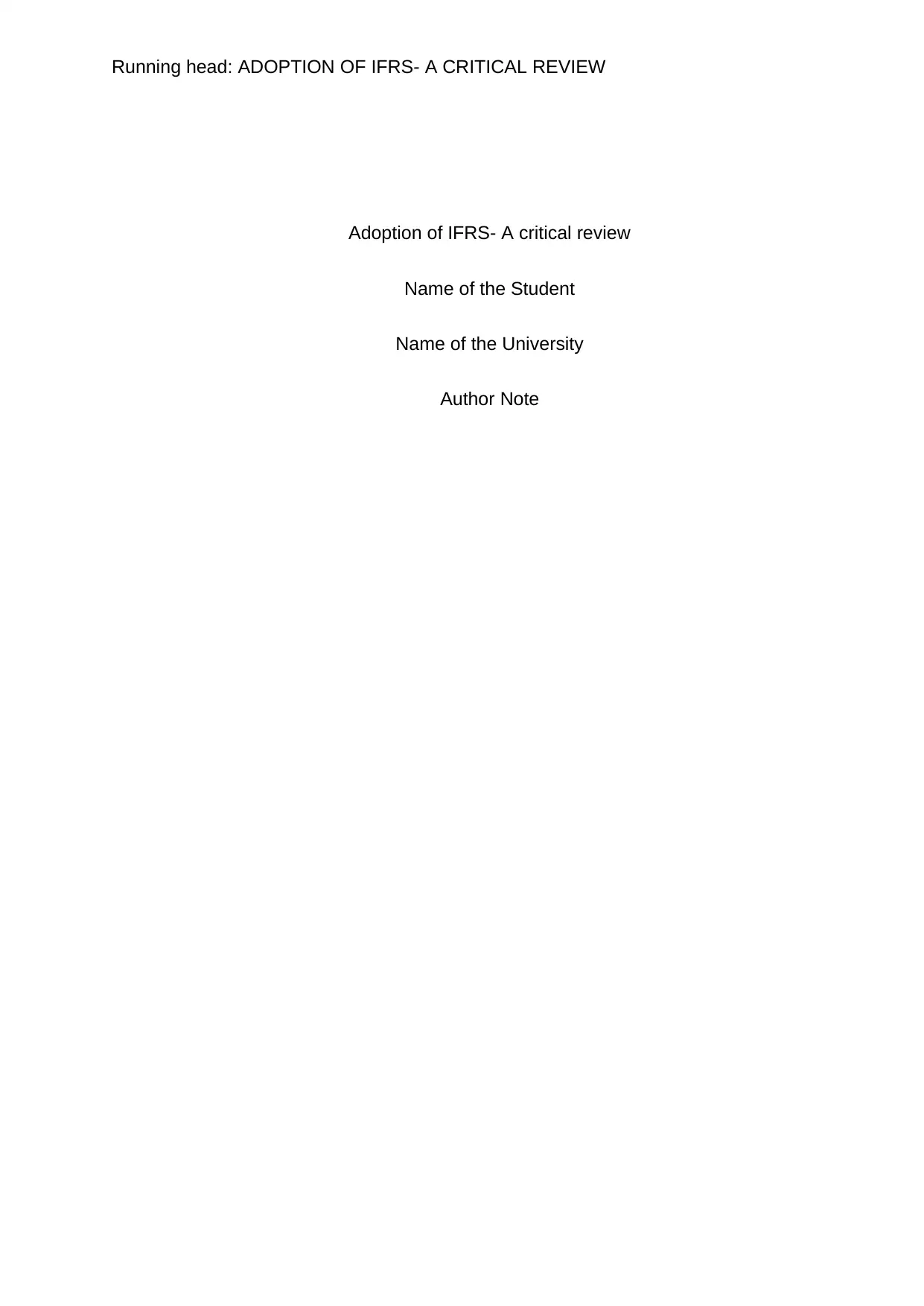
Running head: ADOPTION OF IFRS- A CRITICAL REVIEW
Adoption of IFRS- A critical review
Name of the Student
Name of the University
Author Note
Adoption of IFRS- A critical review
Name of the Student
Name of the University
Author Note
Paraphrase This Document
Need a fresh take? Get an instant paraphrase of this document with our AI Paraphraser
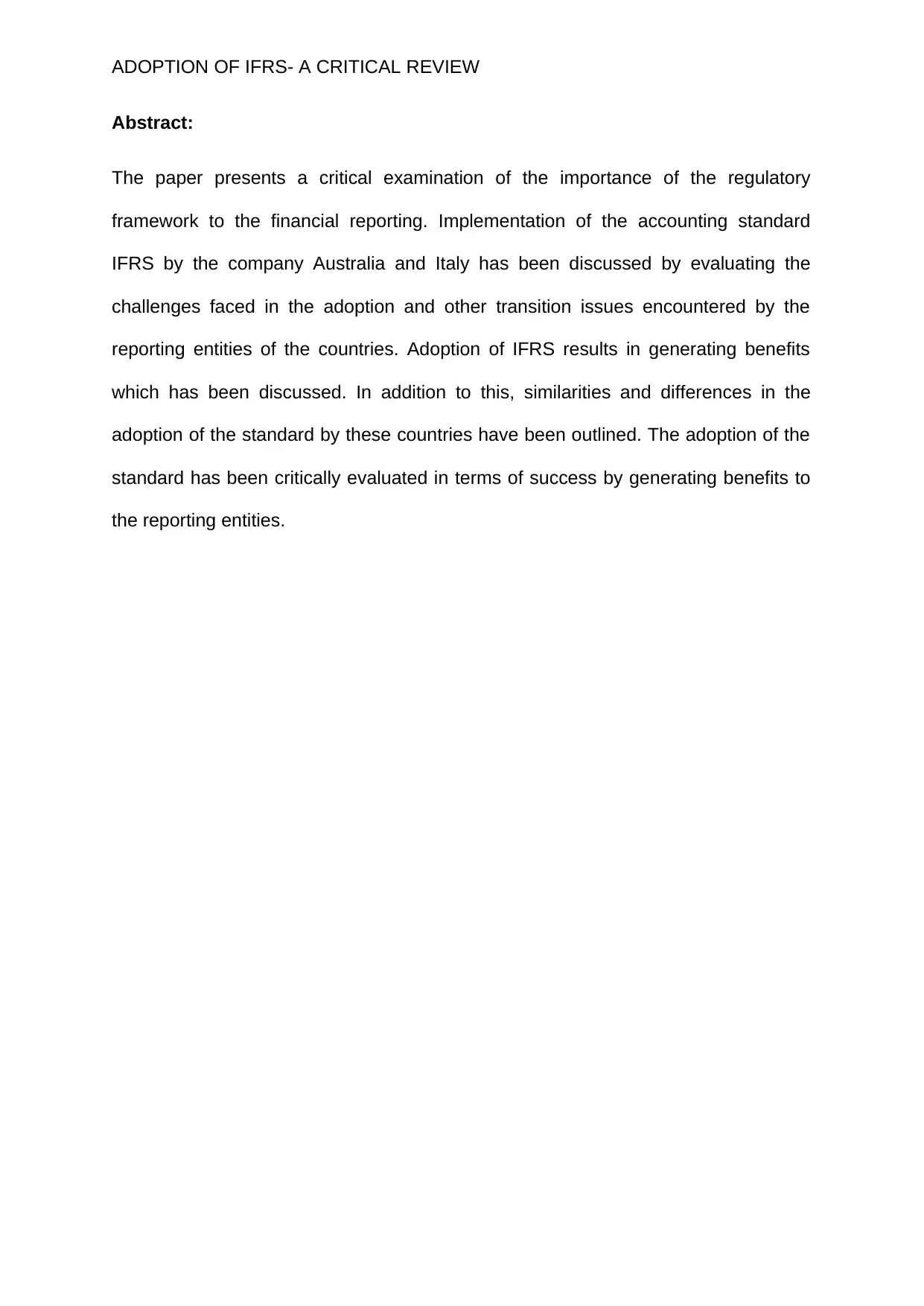
ADOPTION OF IFRS- A CRITICAL REVIEW
Abstract:
The paper presents a critical examination of the importance of the regulatory
framework to the financial reporting. Implementation of the accounting standard
IFRS by the company Australia and Italy has been discussed by evaluating the
challenges faced in the adoption and other transition issues encountered by the
reporting entities of the countries. Adoption of IFRS results in generating benefits
which has been discussed. In addition to this, similarities and differences in the
adoption of the standard by these countries have been outlined. The adoption of the
standard has been critically evaluated in terms of success by generating benefits to
the reporting entities.
Abstract:
The paper presents a critical examination of the importance of the regulatory
framework to the financial reporting. Implementation of the accounting standard
IFRS by the company Australia and Italy has been discussed by evaluating the
challenges faced in the adoption and other transition issues encountered by the
reporting entities of the countries. Adoption of IFRS results in generating benefits
which has been discussed. In addition to this, similarities and differences in the
adoption of the standard by these countries have been outlined. The adoption of the
standard has been critically evaluated in terms of success by generating benefits to
the reporting entities.
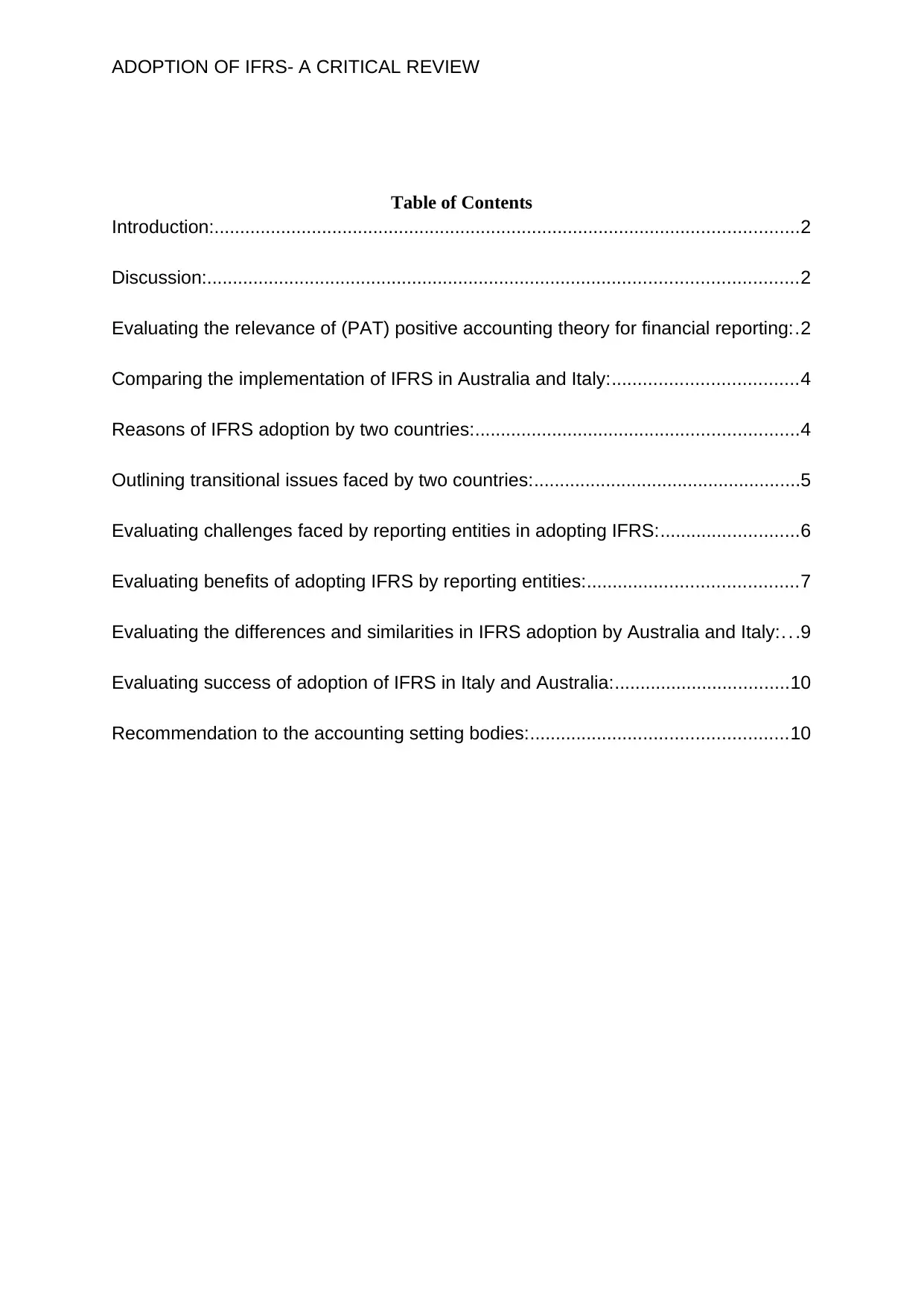
ADOPTION OF IFRS- A CRITICAL REVIEW
Table of Contents
Introduction:..................................................................................................................2
Discussion:...................................................................................................................2
Evaluating the relevance of (PAT) positive accounting theory for financial reporting:.2
Comparing the implementation of IFRS in Australia and Italy:....................................4
Reasons of IFRS adoption by two countries:...............................................................4
Outlining transitional issues faced by two countries:....................................................5
Evaluating challenges faced by reporting entities in adopting IFRS:...........................6
Evaluating benefits of adopting IFRS by reporting entities:.........................................7
Evaluating the differences and similarities in IFRS adoption by Australia and Italy:. . .9
Evaluating success of adoption of IFRS in Italy and Australia:..................................10
Recommendation to the accounting setting bodies:..................................................10
Table of Contents
Introduction:..................................................................................................................2
Discussion:...................................................................................................................2
Evaluating the relevance of (PAT) positive accounting theory for financial reporting:.2
Comparing the implementation of IFRS in Australia and Italy:....................................4
Reasons of IFRS adoption by two countries:...............................................................4
Outlining transitional issues faced by two countries:....................................................5
Evaluating challenges faced by reporting entities in adopting IFRS:...........................6
Evaluating benefits of adopting IFRS by reporting entities:.........................................7
Evaluating the differences and similarities in IFRS adoption by Australia and Italy:. . .9
Evaluating success of adoption of IFRS in Italy and Australia:..................................10
Recommendation to the accounting setting bodies:..................................................10
⊘ This is a preview!⊘
Do you want full access?
Subscribe today to unlock all pages.

Trusted by 1+ million students worldwide
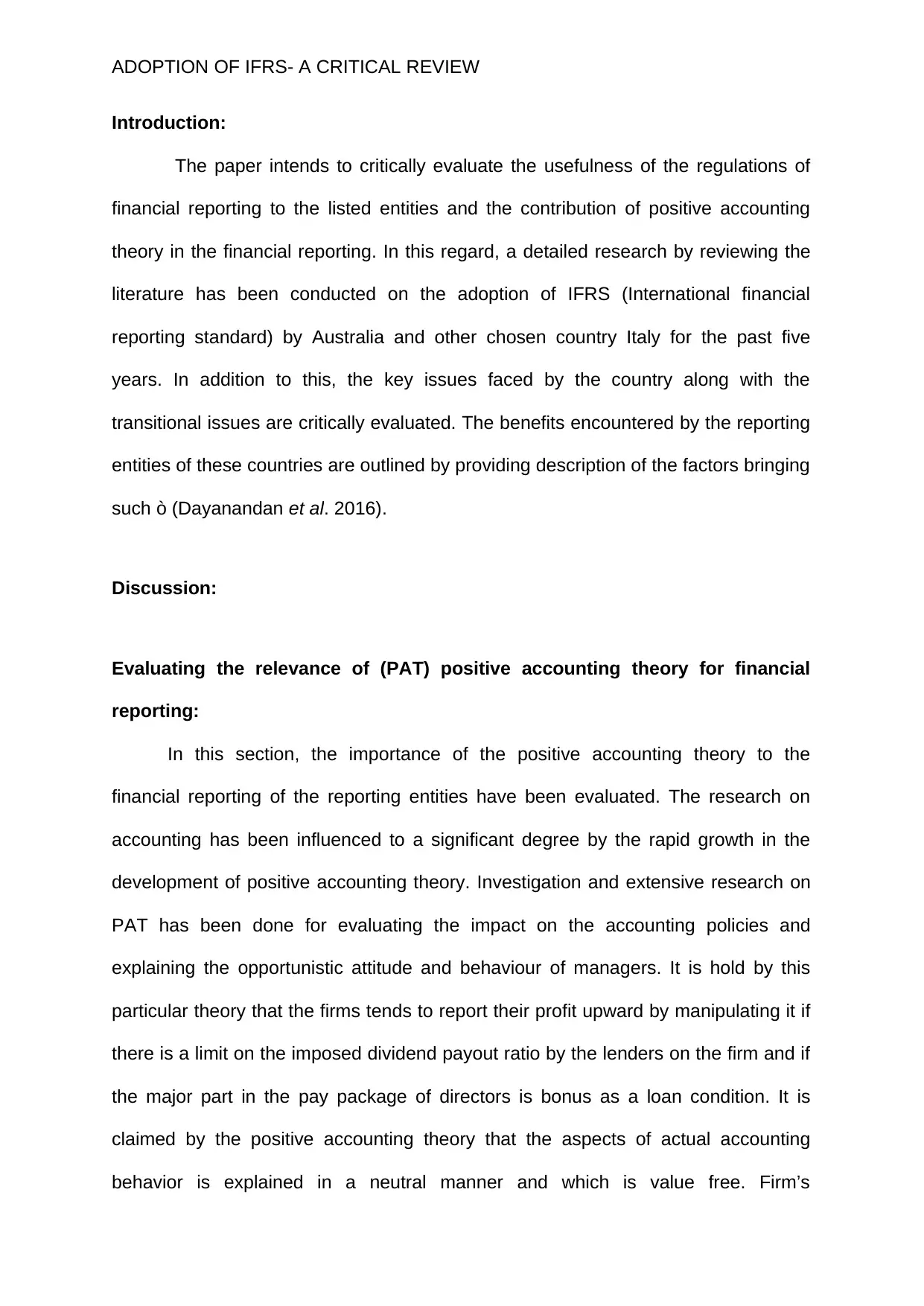
ADOPTION OF IFRS- A CRITICAL REVIEW
Introduction:
The paper intends to critically evaluate the usefulness of the regulations of
financial reporting to the listed entities and the contribution of positive accounting
theory in the financial reporting. In this regard, a detailed research by reviewing the
literature has been conducted on the adoption of IFRS (International financial
reporting standard) by Australia and other chosen country Italy for the past five
years. In addition to this, the key issues faced by the country along with the
transitional issues are critically evaluated. The benefits encountered by the reporting
entities of these countries are outlined by providing description of the factors bringing
such ò (Dayanandan et al. 2016).
Discussion:
Evaluating the relevance of (PAT) positive accounting theory for financial
reporting:
In this section, the importance of the positive accounting theory to the
financial reporting of the reporting entities have been evaluated. The research on
accounting has been influenced to a significant degree by the rapid growth in the
development of positive accounting theory. Investigation and extensive research on
PAT has been done for evaluating the impact on the accounting policies and
explaining the opportunistic attitude and behaviour of managers. It is hold by this
particular theory that the firms tends to report their profit upward by manipulating it if
there is a limit on the imposed dividend payout ratio by the lenders on the firm and if
the major part in the pay package of directors is bonus as a loan condition. It is
claimed by the positive accounting theory that the aspects of actual accounting
behavior is explained in a neutral manner and which is value free. Firm’s
Introduction:
The paper intends to critically evaluate the usefulness of the regulations of
financial reporting to the listed entities and the contribution of positive accounting
theory in the financial reporting. In this regard, a detailed research by reviewing the
literature has been conducted on the adoption of IFRS (International financial
reporting standard) by Australia and other chosen country Italy for the past five
years. In addition to this, the key issues faced by the country along with the
transitional issues are critically evaluated. The benefits encountered by the reporting
entities of these countries are outlined by providing description of the factors bringing
such ò (Dayanandan et al. 2016).
Discussion:
Evaluating the relevance of (PAT) positive accounting theory for financial
reporting:
In this section, the importance of the positive accounting theory to the
financial reporting of the reporting entities have been evaluated. The research on
accounting has been influenced to a significant degree by the rapid growth in the
development of positive accounting theory. Investigation and extensive research on
PAT has been done for evaluating the impact on the accounting policies and
explaining the opportunistic attitude and behaviour of managers. It is hold by this
particular theory that the firms tends to report their profit upward by manipulating it if
there is a limit on the imposed dividend payout ratio by the lenders on the firm and if
the major part in the pay package of directors is bonus as a loan condition. It is
claimed by the positive accounting theory that the aspects of actual accounting
behavior is explained in a neutral manner and which is value free. Firm’s
Paraphrase This Document
Need a fresh take? Get an instant paraphrase of this document with our AI Paraphraser
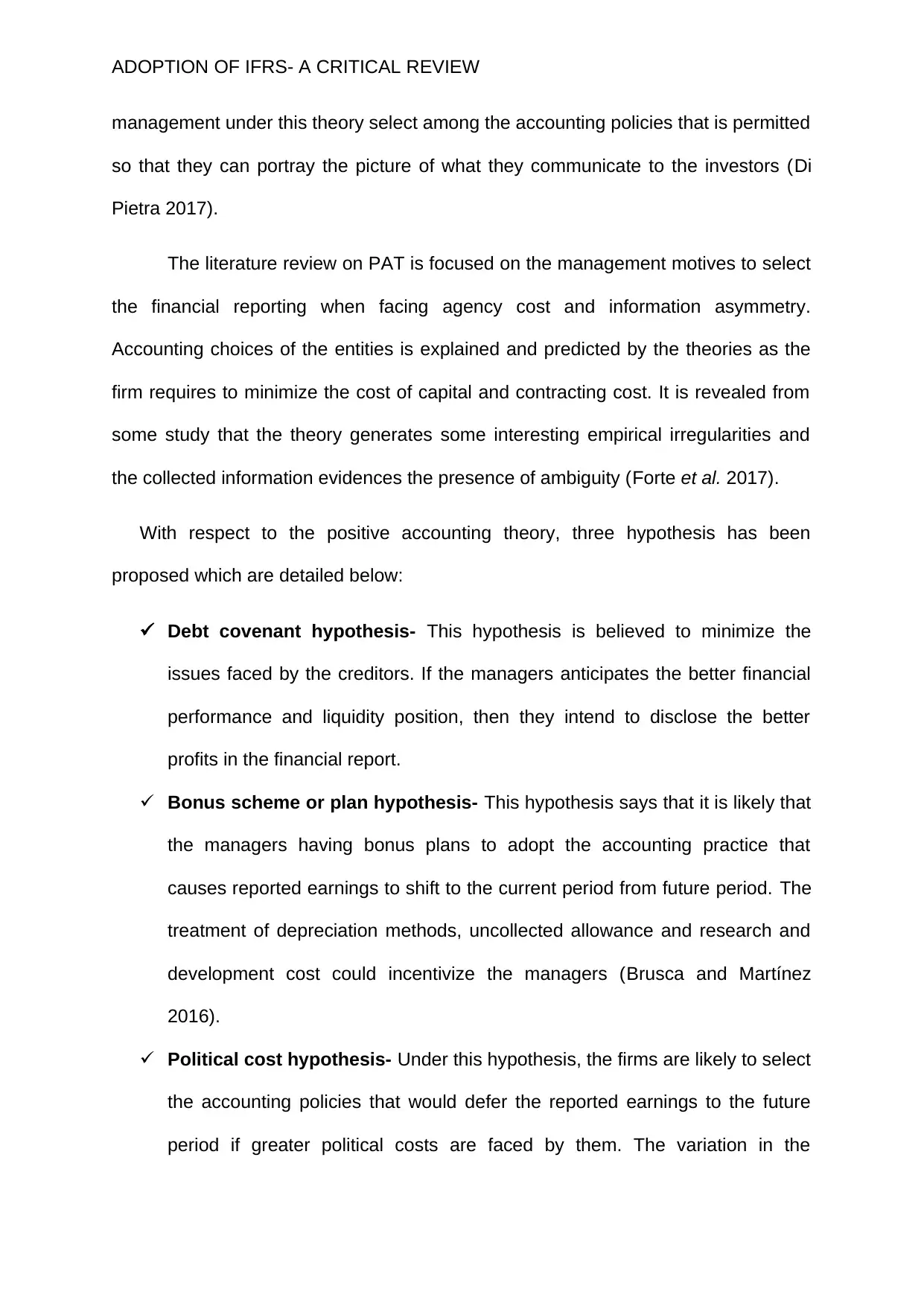
ADOPTION OF IFRS- A CRITICAL REVIEW
management under this theory select among the accounting policies that is permitted
so that they can portray the picture of what they communicate to the investors (Di
Pietra 2017).
The literature review on PAT is focused on the management motives to select
the financial reporting when facing agency cost and information asymmetry.
Accounting choices of the entities is explained and predicted by the theories as the
firm requires to minimize the cost of capital and contracting cost. It is revealed from
some study that the theory generates some interesting empirical irregularities and
the collected information evidences the presence of ambiguity (Forte et al. 2017).
With respect to the positive accounting theory, three hypothesis has been
proposed which are detailed below:
Debt covenant hypothesis- This hypothesis is believed to minimize the
issues faced by the creditors. If the managers anticipates the better financial
performance and liquidity position, then they intend to disclose the better
profits in the financial report.
Bonus scheme or plan hypothesis- This hypothesis says that it is likely that
the managers having bonus plans to adopt the accounting practice that
causes reported earnings to shift to the current period from future period. The
treatment of depreciation methods, uncollected allowance and research and
development cost could incentivize the managers (Brusca and Martínez
2016).
Political cost hypothesis- Under this hypothesis, the firms are likely to select
the accounting policies that would defer the reported earnings to the future
period if greater political costs are faced by them. The variation in the
management under this theory select among the accounting policies that is permitted
so that they can portray the picture of what they communicate to the investors (Di
Pietra 2017).
The literature review on PAT is focused on the management motives to select
the financial reporting when facing agency cost and information asymmetry.
Accounting choices of the entities is explained and predicted by the theories as the
firm requires to minimize the cost of capital and contracting cost. It is revealed from
some study that the theory generates some interesting empirical irregularities and
the collected information evidences the presence of ambiguity (Forte et al. 2017).
With respect to the positive accounting theory, three hypothesis has been
proposed which are detailed below:
Debt covenant hypothesis- This hypothesis is believed to minimize the
issues faced by the creditors. If the managers anticipates the better financial
performance and liquidity position, then they intend to disclose the better
profits in the financial report.
Bonus scheme or plan hypothesis- This hypothesis says that it is likely that
the managers having bonus plans to adopt the accounting practice that
causes reported earnings to shift to the current period from future period. The
treatment of depreciation methods, uncollected allowance and research and
development cost could incentivize the managers (Brusca and Martínez
2016).
Political cost hypothesis- Under this hypothesis, the firms are likely to select
the accounting policies that would defer the reported earnings to the future
period if greater political costs are faced by them. The variation in the
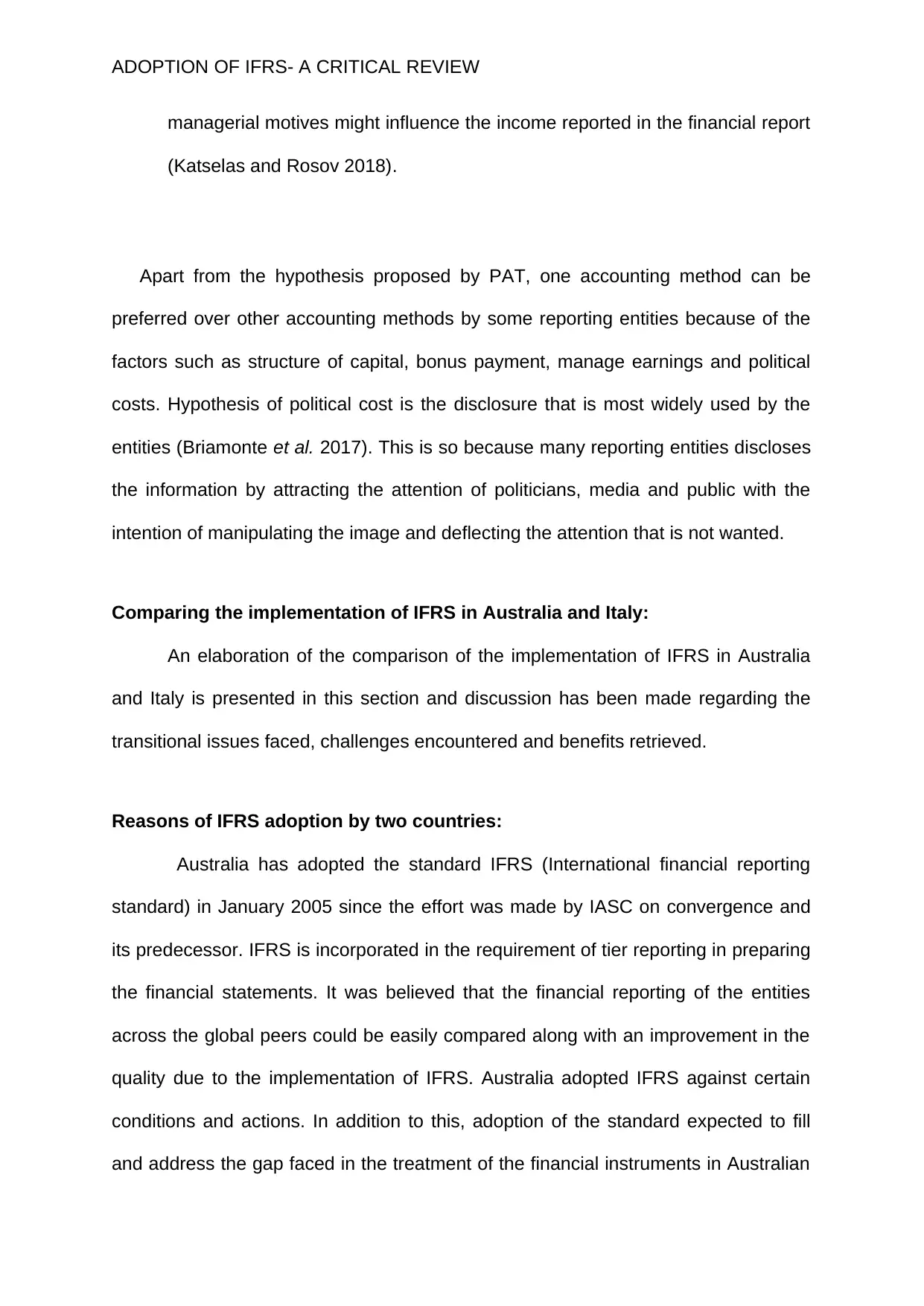
ADOPTION OF IFRS- A CRITICAL REVIEW
managerial motives might influence the income reported in the financial report
(Katselas and Rosov 2018).
Apart from the hypothesis proposed by PAT, one accounting method can be
preferred over other accounting methods by some reporting entities because of the
factors such as structure of capital, bonus payment, manage earnings and political
costs. Hypothesis of political cost is the disclosure that is most widely used by the
entities (Briamonte et al. 2017). This is so because many reporting entities discloses
the information by attracting the attention of politicians, media and public with the
intention of manipulating the image and deflecting the attention that is not wanted.
Comparing the implementation of IFRS in Australia and Italy:
An elaboration of the comparison of the implementation of IFRS in Australia
and Italy is presented in this section and discussion has been made regarding the
transitional issues faced, challenges encountered and benefits retrieved.
Reasons of IFRS adoption by two countries:
Australia has adopted the standard IFRS (International financial reporting
standard) in January 2005 since the effort was made by IASC on convergence and
its predecessor. IFRS is incorporated in the requirement of tier reporting in preparing
the financial statements. It was believed that the financial reporting of the entities
across the global peers could be easily compared along with an improvement in the
quality due to the implementation of IFRS. Australia adopted IFRS against certain
conditions and actions. In addition to this, adoption of the standard expected to fill
and address the gap faced in the treatment of the financial instruments in Australian
managerial motives might influence the income reported in the financial report
(Katselas and Rosov 2018).
Apart from the hypothesis proposed by PAT, one accounting method can be
preferred over other accounting methods by some reporting entities because of the
factors such as structure of capital, bonus payment, manage earnings and political
costs. Hypothesis of political cost is the disclosure that is most widely used by the
entities (Briamonte et al. 2017). This is so because many reporting entities discloses
the information by attracting the attention of politicians, media and public with the
intention of manipulating the image and deflecting the attention that is not wanted.
Comparing the implementation of IFRS in Australia and Italy:
An elaboration of the comparison of the implementation of IFRS in Australia
and Italy is presented in this section and discussion has been made regarding the
transitional issues faced, challenges encountered and benefits retrieved.
Reasons of IFRS adoption by two countries:
Australia has adopted the standard IFRS (International financial reporting
standard) in January 2005 since the effort was made by IASC on convergence and
its predecessor. IFRS is incorporated in the requirement of tier reporting in preparing
the financial statements. It was believed that the financial reporting of the entities
across the global peers could be easily compared along with an improvement in the
quality due to the implementation of IFRS. Australia adopted IFRS against certain
conditions and actions. In addition to this, adoption of the standard expected to fill
and address the gap faced in the treatment of the financial instruments in Australian
⊘ This is a preview!⊘
Do you want full access?
Subscribe today to unlock all pages.

Trusted by 1+ million students worldwide
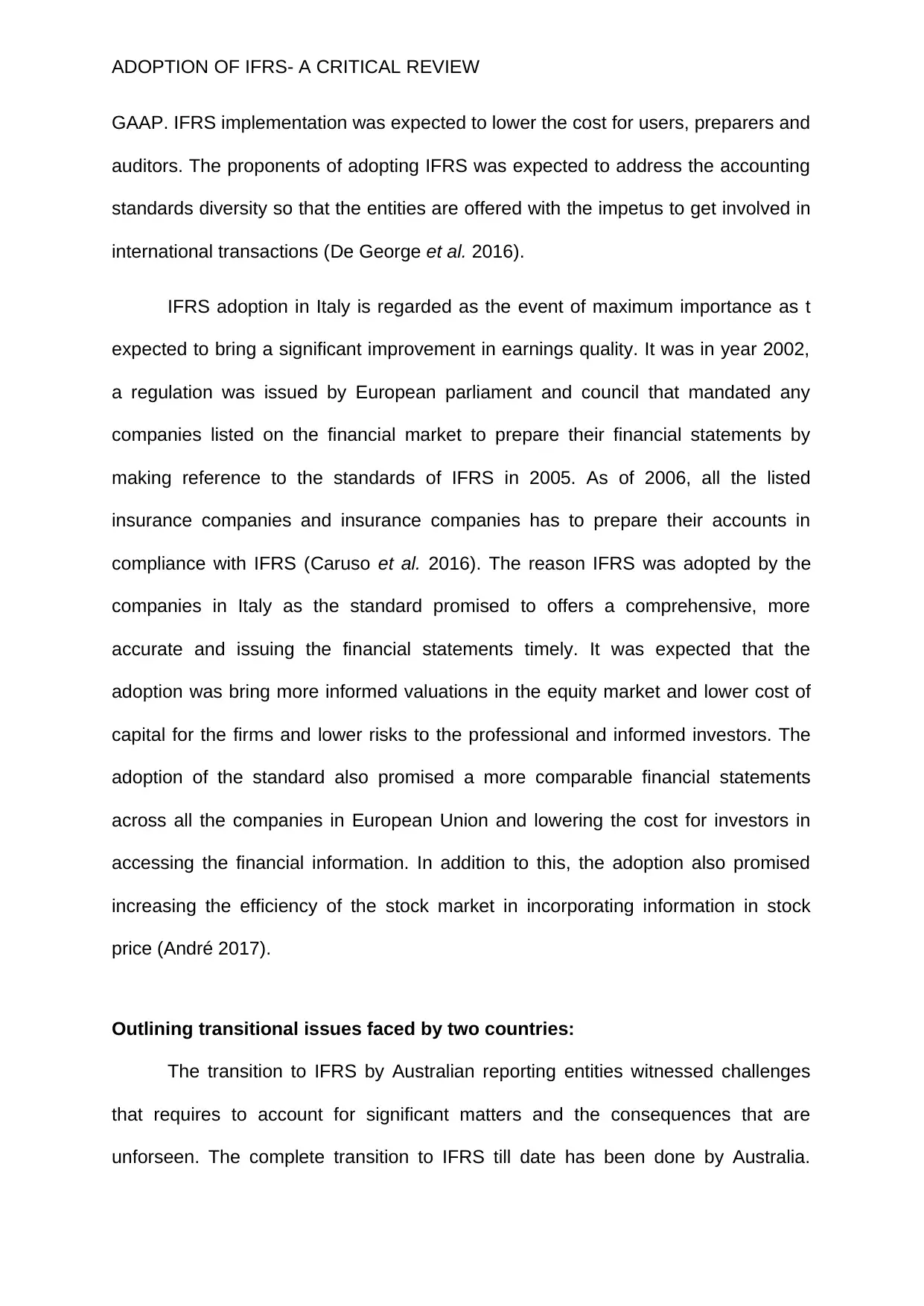
ADOPTION OF IFRS- A CRITICAL REVIEW
GAAP. IFRS implementation was expected to lower the cost for users, preparers and
auditors. The proponents of adopting IFRS was expected to address the accounting
standards diversity so that the entities are offered with the impetus to get involved in
international transactions (De George et al. 2016).
IFRS adoption in Italy is regarded as the event of maximum importance as t
expected to bring a significant improvement in earnings quality. It was in year 2002,
a regulation was issued by European parliament and council that mandated any
companies listed on the financial market to prepare their financial statements by
making reference to the standards of IFRS in 2005. As of 2006, all the listed
insurance companies and insurance companies has to prepare their accounts in
compliance with IFRS (Caruso et al. 2016). The reason IFRS was adopted by the
companies in Italy as the standard promised to offers a comprehensive, more
accurate and issuing the financial statements timely. It was expected that the
adoption was bring more informed valuations in the equity market and lower cost of
capital for the firms and lower risks to the professional and informed investors. The
adoption of the standard also promised a more comparable financial statements
across all the companies in European Union and lowering the cost for investors in
accessing the financial information. In addition to this, the adoption also promised
increasing the efficiency of the stock market in incorporating information in stock
price (André 2017).
Outlining transitional issues faced by two countries:
The transition to IFRS by Australian reporting entities witnessed challenges
that requires to account for significant matters and the consequences that are
unforseen. The complete transition to IFRS till date has been done by Australia.
GAAP. IFRS implementation was expected to lower the cost for users, preparers and
auditors. The proponents of adopting IFRS was expected to address the accounting
standards diversity so that the entities are offered with the impetus to get involved in
international transactions (De George et al. 2016).
IFRS adoption in Italy is regarded as the event of maximum importance as t
expected to bring a significant improvement in earnings quality. It was in year 2002,
a regulation was issued by European parliament and council that mandated any
companies listed on the financial market to prepare their financial statements by
making reference to the standards of IFRS in 2005. As of 2006, all the listed
insurance companies and insurance companies has to prepare their accounts in
compliance with IFRS (Caruso et al. 2016). The reason IFRS was adopted by the
companies in Italy as the standard promised to offers a comprehensive, more
accurate and issuing the financial statements timely. It was expected that the
adoption was bring more informed valuations in the equity market and lower cost of
capital for the firms and lower risks to the professional and informed investors. The
adoption of the standard also promised a more comparable financial statements
across all the companies in European Union and lowering the cost for investors in
accessing the financial information. In addition to this, the adoption also promised
increasing the efficiency of the stock market in incorporating information in stock
price (André 2017).
Outlining transitional issues faced by two countries:
The transition to IFRS by Australian reporting entities witnessed challenges
that requires to account for significant matters and the consequences that are
unforseen. The complete transition to IFRS till date has been done by Australia.
Paraphrase This Document
Need a fresh take? Get an instant paraphrase of this document with our AI Paraphraser
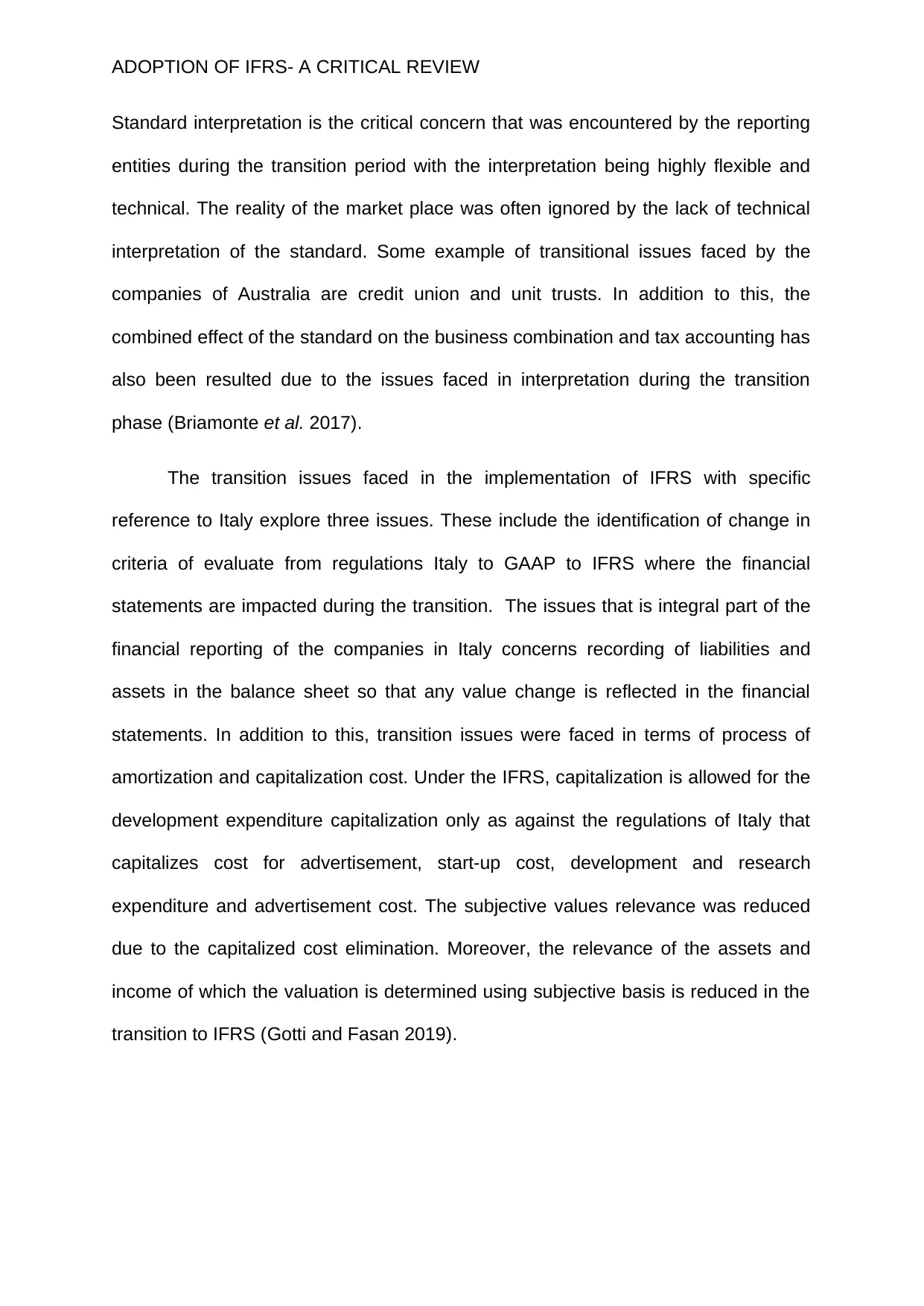
ADOPTION OF IFRS- A CRITICAL REVIEW
Standard interpretation is the critical concern that was encountered by the reporting
entities during the transition period with the interpretation being highly flexible and
technical. The reality of the market place was often ignored by the lack of technical
interpretation of the standard. Some example of transitional issues faced by the
companies of Australia are credit union and unit trusts. In addition to this, the
combined effect of the standard on the business combination and tax accounting has
also been resulted due to the issues faced in interpretation during the transition
phase (Briamonte et al. 2017).
The transition issues faced in the implementation of IFRS with specific
reference to Italy explore three issues. These include the identification of change in
criteria of evaluate from regulations Italy to GAAP to IFRS where the financial
statements are impacted during the transition. The issues that is integral part of the
financial reporting of the companies in Italy concerns recording of liabilities and
assets in the balance sheet so that any value change is reflected in the financial
statements. In addition to this, transition issues were faced in terms of process of
amortization and capitalization cost. Under the IFRS, capitalization is allowed for the
development expenditure capitalization only as against the regulations of Italy that
capitalizes cost for advertisement, start-up cost, development and research
expenditure and advertisement cost. The subjective values relevance was reduced
due to the capitalized cost elimination. Moreover, the relevance of the assets and
income of which the valuation is determined using subjective basis is reduced in the
transition to IFRS (Gotti and Fasan 2019).
Standard interpretation is the critical concern that was encountered by the reporting
entities during the transition period with the interpretation being highly flexible and
technical. The reality of the market place was often ignored by the lack of technical
interpretation of the standard. Some example of transitional issues faced by the
companies of Australia are credit union and unit trusts. In addition to this, the
combined effect of the standard on the business combination and tax accounting has
also been resulted due to the issues faced in interpretation during the transition
phase (Briamonte et al. 2017).
The transition issues faced in the implementation of IFRS with specific
reference to Italy explore three issues. These include the identification of change in
criteria of evaluate from regulations Italy to GAAP to IFRS where the financial
statements are impacted during the transition. The issues that is integral part of the
financial reporting of the companies in Italy concerns recording of liabilities and
assets in the balance sheet so that any value change is reflected in the financial
statements. In addition to this, transition issues were faced in terms of process of
amortization and capitalization cost. Under the IFRS, capitalization is allowed for the
development expenditure capitalization only as against the regulations of Italy that
capitalizes cost for advertisement, start-up cost, development and research
expenditure and advertisement cost. The subjective values relevance was reduced
due to the capitalized cost elimination. Moreover, the relevance of the assets and
income of which the valuation is determined using subjective basis is reduced in the
transition to IFRS (Gotti and Fasan 2019).
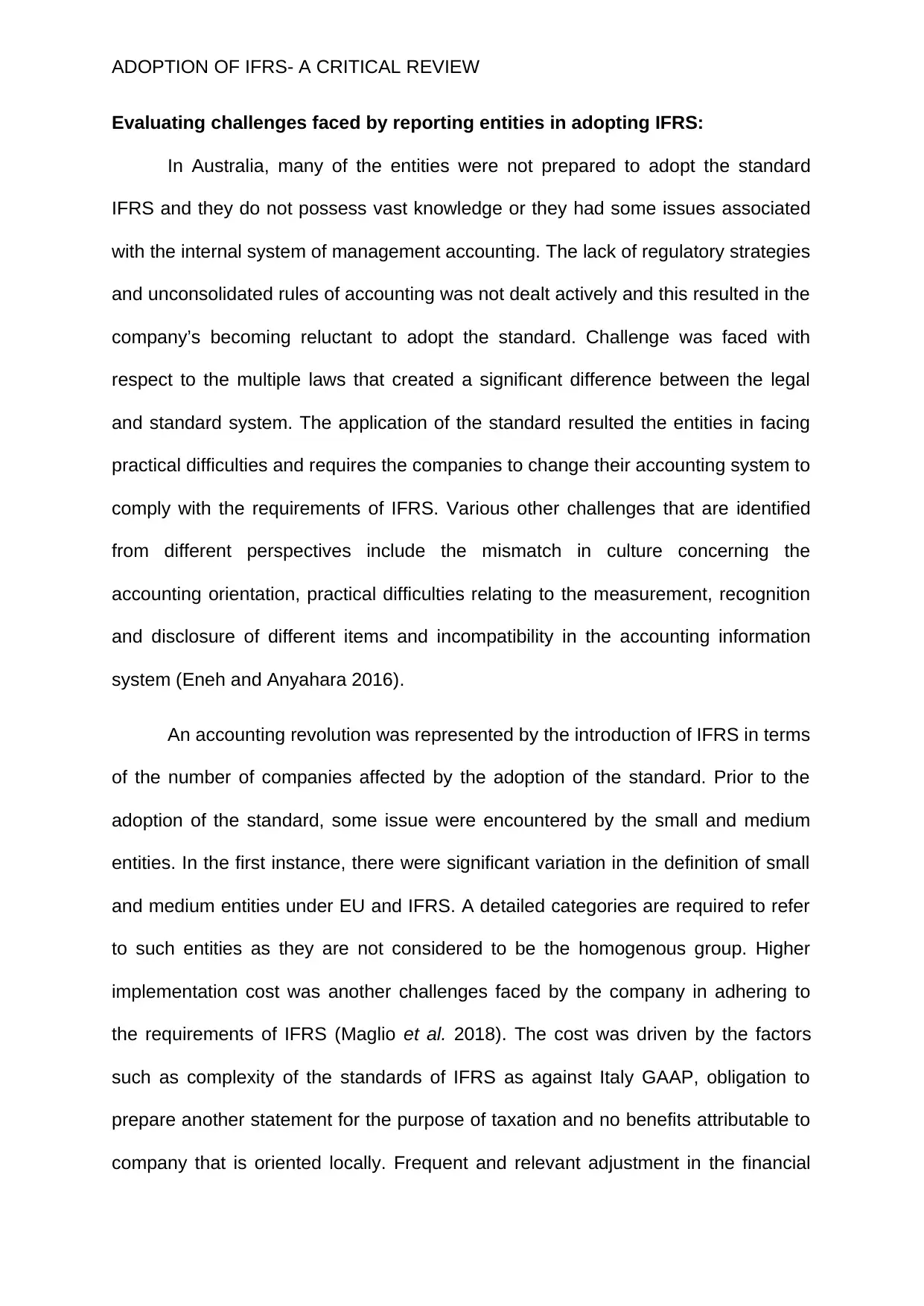
ADOPTION OF IFRS- A CRITICAL REVIEW
Evaluating challenges faced by reporting entities in adopting IFRS:
In Australia, many of the entities were not prepared to adopt the standard
IFRS and they do not possess vast knowledge or they had some issues associated
with the internal system of management accounting. The lack of regulatory strategies
and unconsolidated rules of accounting was not dealt actively and this resulted in the
company’s becoming reluctant to adopt the standard. Challenge was faced with
respect to the multiple laws that created a significant difference between the legal
and standard system. The application of the standard resulted the entities in facing
practical difficulties and requires the companies to change their accounting system to
comply with the requirements of IFRS. Various other challenges that are identified
from different perspectives include the mismatch in culture concerning the
accounting orientation, practical difficulties relating to the measurement, recognition
and disclosure of different items and incompatibility in the accounting information
system (Eneh and Anyahara 2016).
An accounting revolution was represented by the introduction of IFRS in terms
of the number of companies affected by the adoption of the standard. Prior to the
adoption of the standard, some issue were encountered by the small and medium
entities. In the first instance, there were significant variation in the definition of small
and medium entities under EU and IFRS. A detailed categories are required to refer
to such entities as they are not considered to be the homogenous group. Higher
implementation cost was another challenges faced by the company in adhering to
the requirements of IFRS (Maglio et al. 2018). The cost was driven by the factors
such as complexity of the standards of IFRS as against Italy GAAP, obligation to
prepare another statement for the purpose of taxation and no benefits attributable to
company that is oriented locally. Frequent and relevant adjustment in the financial
Evaluating challenges faced by reporting entities in adopting IFRS:
In Australia, many of the entities were not prepared to adopt the standard
IFRS and they do not possess vast knowledge or they had some issues associated
with the internal system of management accounting. The lack of regulatory strategies
and unconsolidated rules of accounting was not dealt actively and this resulted in the
company’s becoming reluctant to adopt the standard. Challenge was faced with
respect to the multiple laws that created a significant difference between the legal
and standard system. The application of the standard resulted the entities in facing
practical difficulties and requires the companies to change their accounting system to
comply with the requirements of IFRS. Various other challenges that are identified
from different perspectives include the mismatch in culture concerning the
accounting orientation, practical difficulties relating to the measurement, recognition
and disclosure of different items and incompatibility in the accounting information
system (Eneh and Anyahara 2016).
An accounting revolution was represented by the introduction of IFRS in terms
of the number of companies affected by the adoption of the standard. Prior to the
adoption of the standard, some issue were encountered by the small and medium
entities. In the first instance, there were significant variation in the definition of small
and medium entities under EU and IFRS. A detailed categories are required to refer
to such entities as they are not considered to be the homogenous group. Higher
implementation cost was another challenges faced by the company in adhering to
the requirements of IFRS (Maglio et al. 2018). The cost was driven by the factors
such as complexity of the standards of IFRS as against Italy GAAP, obligation to
prepare another statement for the purpose of taxation and no benefits attributable to
company that is oriented locally. Frequent and relevant adjustment in the financial
⊘ This is a preview!⊘
Do you want full access?
Subscribe today to unlock all pages.

Trusted by 1+ million students worldwide
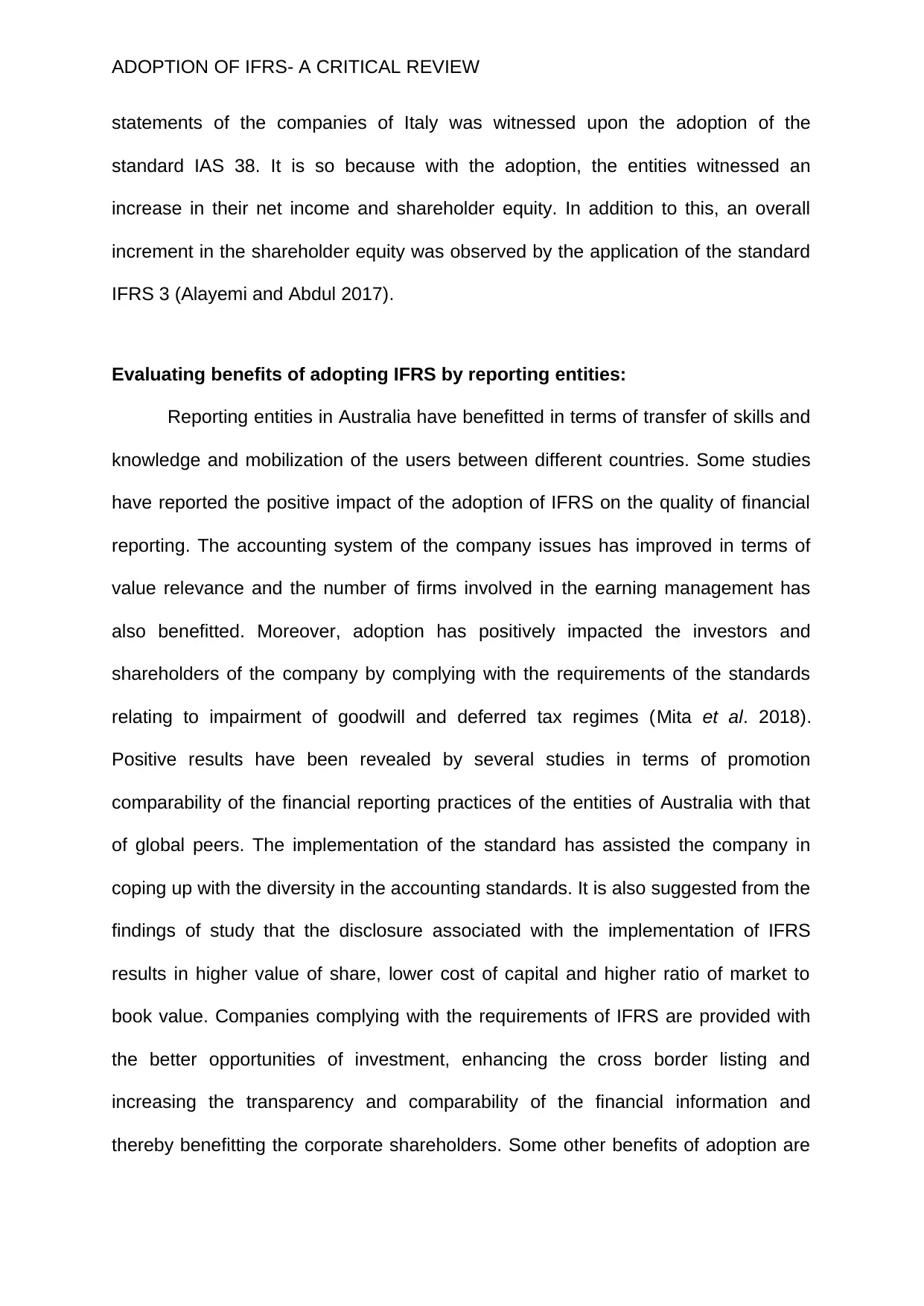
ADOPTION OF IFRS- A CRITICAL REVIEW
statements of the companies of Italy was witnessed upon the adoption of the
standard IAS 38. It is so because with the adoption, the entities witnessed an
increase in their net income and shareholder equity. In addition to this, an overall
increment in the shareholder equity was observed by the application of the standard
IFRS 3 (Alayemi and Abdul 2017).
Evaluating benefits of adopting IFRS by reporting entities:
Reporting entities in Australia have benefitted in terms of transfer of skills and
knowledge and mobilization of the users between different countries. Some studies
have reported the positive impact of the adoption of IFRS on the quality of financial
reporting. The accounting system of the company issues has improved in terms of
value relevance and the number of firms involved in the earning management has
also benefitted. Moreover, adoption has positively impacted the investors and
shareholders of the company by complying with the requirements of the standards
relating to impairment of goodwill and deferred tax regimes (Mita et al. 2018).
Positive results have been revealed by several studies in terms of promotion
comparability of the financial reporting practices of the entities of Australia with that
of global peers. The implementation of the standard has assisted the company in
coping up with the diversity in the accounting standards. It is also suggested from the
findings of study that the disclosure associated with the implementation of IFRS
results in higher value of share, lower cost of capital and higher ratio of market to
book value. Companies complying with the requirements of IFRS are provided with
the better opportunities of investment, enhancing the cross border listing and
increasing the transparency and comparability of the financial information and
thereby benefitting the corporate shareholders. Some other benefits of adoption are
statements of the companies of Italy was witnessed upon the adoption of the
standard IAS 38. It is so because with the adoption, the entities witnessed an
increase in their net income and shareholder equity. In addition to this, an overall
increment in the shareholder equity was observed by the application of the standard
IFRS 3 (Alayemi and Abdul 2017).
Evaluating benefits of adopting IFRS by reporting entities:
Reporting entities in Australia have benefitted in terms of transfer of skills and
knowledge and mobilization of the users between different countries. Some studies
have reported the positive impact of the adoption of IFRS on the quality of financial
reporting. The accounting system of the company issues has improved in terms of
value relevance and the number of firms involved in the earning management has
also benefitted. Moreover, adoption has positively impacted the investors and
shareholders of the company by complying with the requirements of the standards
relating to impairment of goodwill and deferred tax regimes (Mita et al. 2018).
Positive results have been revealed by several studies in terms of promotion
comparability of the financial reporting practices of the entities of Australia with that
of global peers. The implementation of the standard has assisted the company in
coping up with the diversity in the accounting standards. It is also suggested from the
findings of study that the disclosure associated with the implementation of IFRS
results in higher value of share, lower cost of capital and higher ratio of market to
book value. Companies complying with the requirements of IFRS are provided with
the better opportunities of investment, enhancing the cross border listing and
increasing the transparency and comparability of the financial information and
thereby benefitting the corporate shareholders. Some other benefits of adoption are
Paraphrase This Document
Need a fresh take? Get an instant paraphrase of this document with our AI Paraphraser
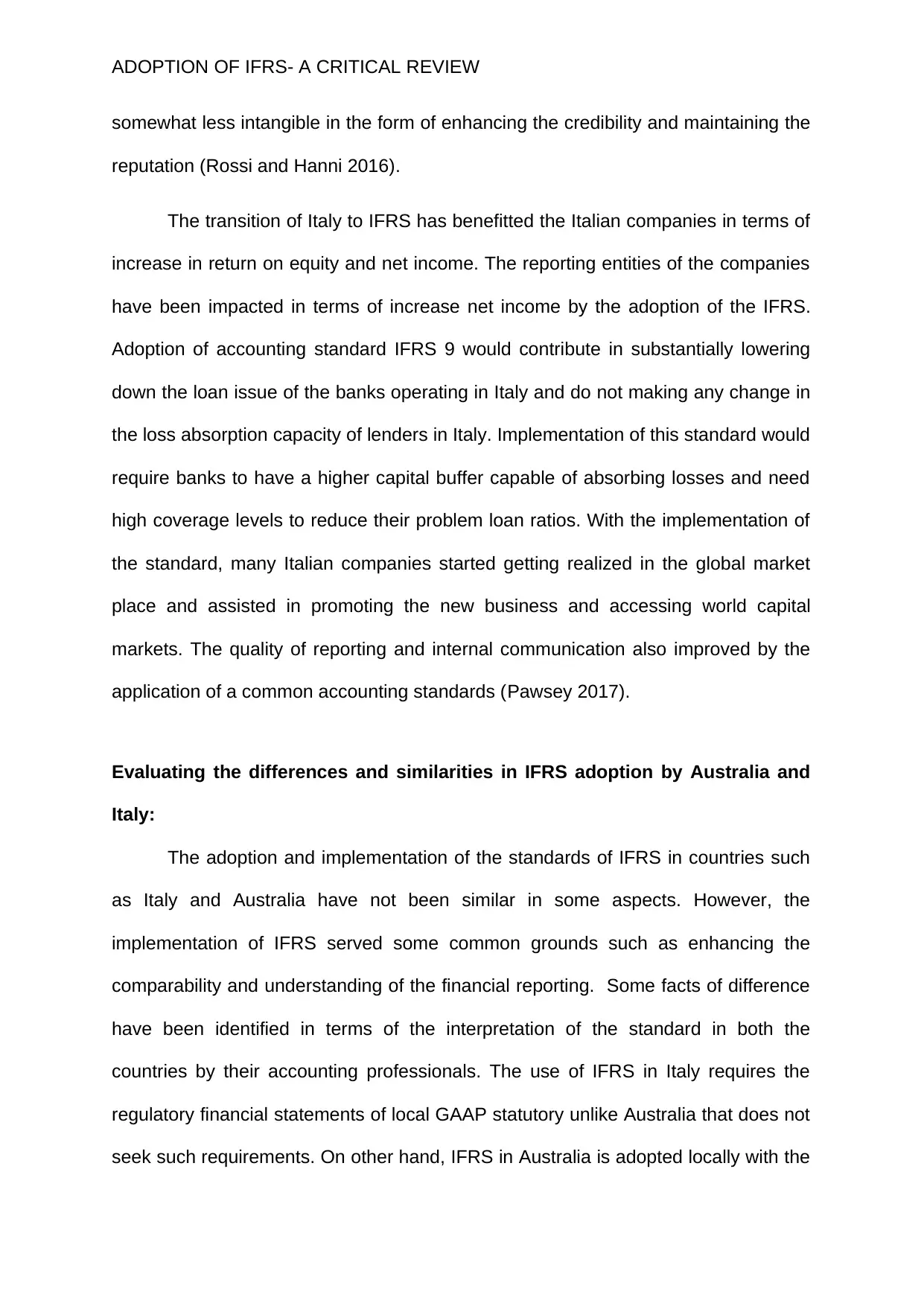
ADOPTION OF IFRS- A CRITICAL REVIEW
somewhat less intangible in the form of enhancing the credibility and maintaining the
reputation (Rossi and Hanni 2016).
The transition of Italy to IFRS has benefitted the Italian companies in terms of
increase in return on equity and net income. The reporting entities of the companies
have been impacted in terms of increase net income by the adoption of the IFRS.
Adoption of accounting standard IFRS 9 would contribute in substantially lowering
down the loan issue of the banks operating in Italy and do not making any change in
the loss absorption capacity of lenders in Italy. Implementation of this standard would
require banks to have a higher capital buffer capable of absorbing losses and need
high coverage levels to reduce their problem loan ratios. With the implementation of
the standard, many Italian companies started getting realized in the global market
place and assisted in promoting the new business and accessing world capital
markets. The quality of reporting and internal communication also improved by the
application of a common accounting standards (Pawsey 2017).
Evaluating the differences and similarities in IFRS adoption by Australia and
Italy:
The adoption and implementation of the standards of IFRS in countries such
as Italy and Australia have not been similar in some aspects. However, the
implementation of IFRS served some common grounds such as enhancing the
comparability and understanding of the financial reporting. Some facts of difference
have been identified in terms of the interpretation of the standard in both the
countries by their accounting professionals. The use of IFRS in Italy requires the
regulatory financial statements of local GAAP statutory unlike Australia that does not
seek such requirements. On other hand, IFRS in Australia is adopted locally with the
somewhat less intangible in the form of enhancing the credibility and maintaining the
reputation (Rossi and Hanni 2016).
The transition of Italy to IFRS has benefitted the Italian companies in terms of
increase in return on equity and net income. The reporting entities of the companies
have been impacted in terms of increase net income by the adoption of the IFRS.
Adoption of accounting standard IFRS 9 would contribute in substantially lowering
down the loan issue of the banks operating in Italy and do not making any change in
the loss absorption capacity of lenders in Italy. Implementation of this standard would
require banks to have a higher capital buffer capable of absorbing losses and need
high coverage levels to reduce their problem loan ratios. With the implementation of
the standard, many Italian companies started getting realized in the global market
place and assisted in promoting the new business and accessing world capital
markets. The quality of reporting and internal communication also improved by the
application of a common accounting standards (Pawsey 2017).
Evaluating the differences and similarities in IFRS adoption by Australia and
Italy:
The adoption and implementation of the standards of IFRS in countries such
as Italy and Australia have not been similar in some aspects. However, the
implementation of IFRS served some common grounds such as enhancing the
comparability and understanding of the financial reporting. Some facts of difference
have been identified in terms of the interpretation of the standard in both the
countries by their accounting professionals. The use of IFRS in Italy requires the
regulatory financial statements of local GAAP statutory unlike Australia that does not
seek such requirements. On other hand, IFRS in Australia is adopted locally with the
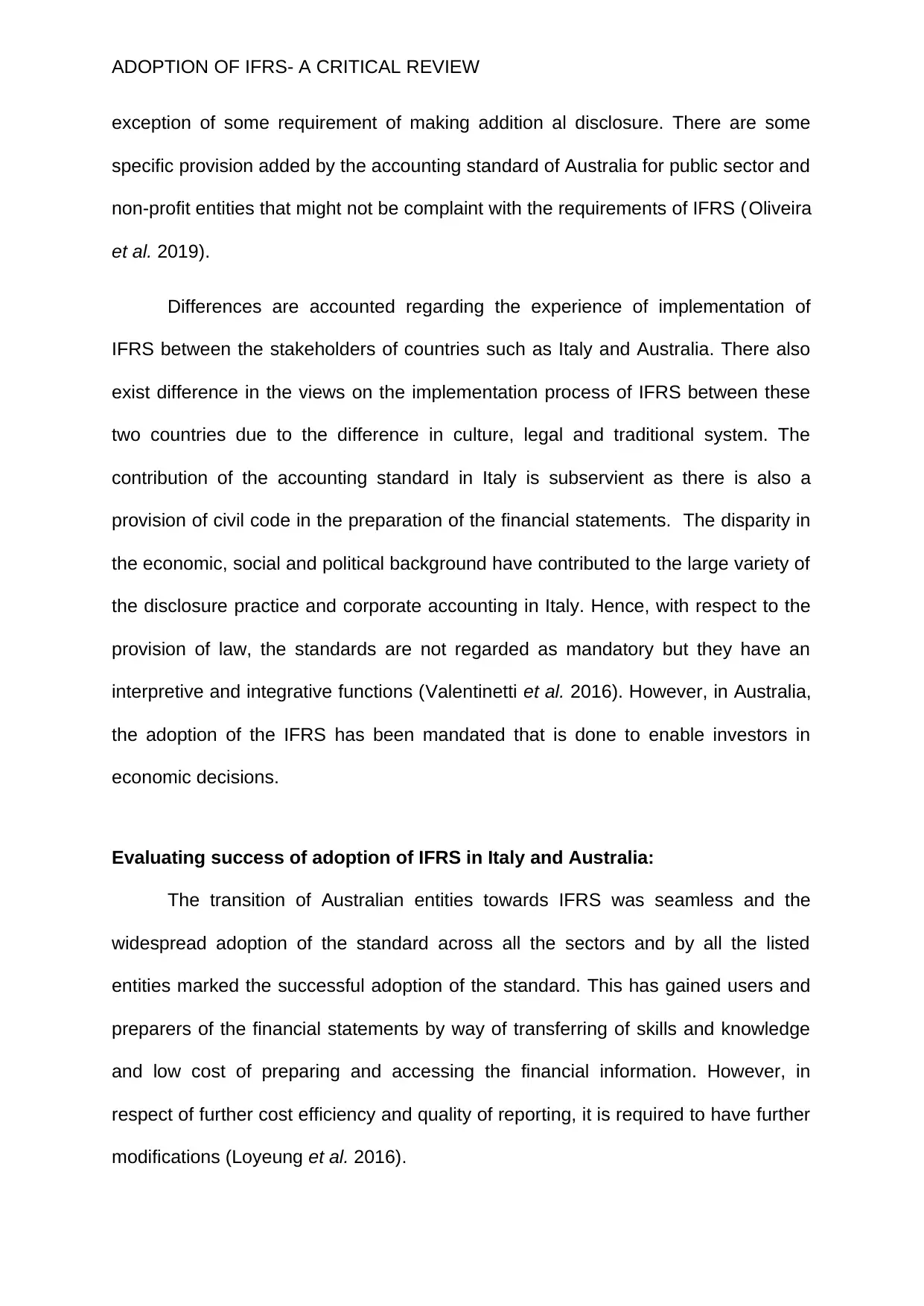
ADOPTION OF IFRS- A CRITICAL REVIEW
exception of some requirement of making addition al disclosure. There are some
specific provision added by the accounting standard of Australia for public sector and
non-profit entities that might not be complaint with the requirements of IFRS ( Oliveira
et al. 2019).
Differences are accounted regarding the experience of implementation of
IFRS between the stakeholders of countries such as Italy and Australia. There also
exist difference in the views on the implementation process of IFRS between these
two countries due to the difference in culture, legal and traditional system. The
contribution of the accounting standard in Italy is subservient as there is also a
provision of civil code in the preparation of the financial statements. The disparity in
the economic, social and political background have contributed to the large variety of
the disclosure practice and corporate accounting in Italy. Hence, with respect to the
provision of law, the standards are not regarded as mandatory but they have an
interpretive and integrative functions (Valentinetti et al. 2016). However, in Australia,
the adoption of the IFRS has been mandated that is done to enable investors in
economic decisions.
Evaluating success of adoption of IFRS in Italy and Australia:
The transition of Australian entities towards IFRS was seamless and the
widespread adoption of the standard across all the sectors and by all the listed
entities marked the successful adoption of the standard. This has gained users and
preparers of the financial statements by way of transferring of skills and knowledge
and low cost of preparing and accessing the financial information. However, in
respect of further cost efficiency and quality of reporting, it is required to have further
modifications (Loyeung et al. 2016).
exception of some requirement of making addition al disclosure. There are some
specific provision added by the accounting standard of Australia for public sector and
non-profit entities that might not be complaint with the requirements of IFRS ( Oliveira
et al. 2019).
Differences are accounted regarding the experience of implementation of
IFRS between the stakeholders of countries such as Italy and Australia. There also
exist difference in the views on the implementation process of IFRS between these
two countries due to the difference in culture, legal and traditional system. The
contribution of the accounting standard in Italy is subservient as there is also a
provision of civil code in the preparation of the financial statements. The disparity in
the economic, social and political background have contributed to the large variety of
the disclosure practice and corporate accounting in Italy. Hence, with respect to the
provision of law, the standards are not regarded as mandatory but they have an
interpretive and integrative functions (Valentinetti et al. 2016). However, in Australia,
the adoption of the IFRS has been mandated that is done to enable investors in
economic decisions.
Evaluating success of adoption of IFRS in Italy and Australia:
The transition of Australian entities towards IFRS was seamless and the
widespread adoption of the standard across all the sectors and by all the listed
entities marked the successful adoption of the standard. This has gained users and
preparers of the financial statements by way of transferring of skills and knowledge
and low cost of preparing and accessing the financial information. However, in
respect of further cost efficiency and quality of reporting, it is required to have further
modifications (Loyeung et al. 2016).
⊘ This is a preview!⊘
Do you want full access?
Subscribe today to unlock all pages.

Trusted by 1+ million students worldwide
1 out of 17
Related Documents
Your All-in-One AI-Powered Toolkit for Academic Success.
+13062052269
info@desklib.com
Available 24*7 on WhatsApp / Email
![[object Object]](/_next/static/media/star-bottom.7253800d.svg)
Unlock your academic potential
Copyright © 2020–2026 A2Z Services. All Rights Reserved. Developed and managed by ZUCOL.





